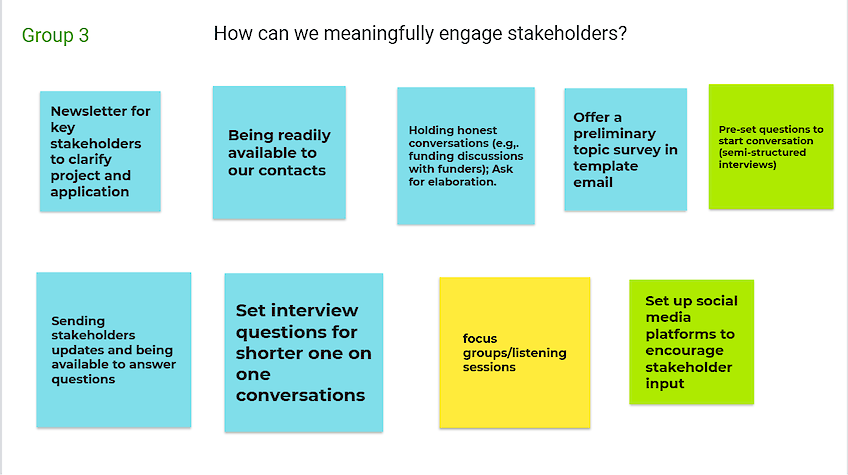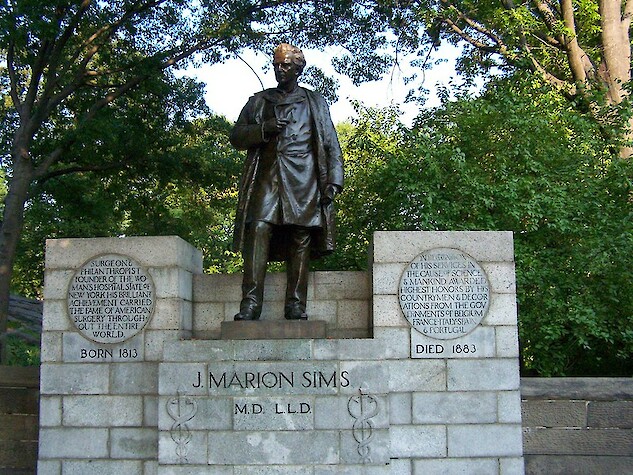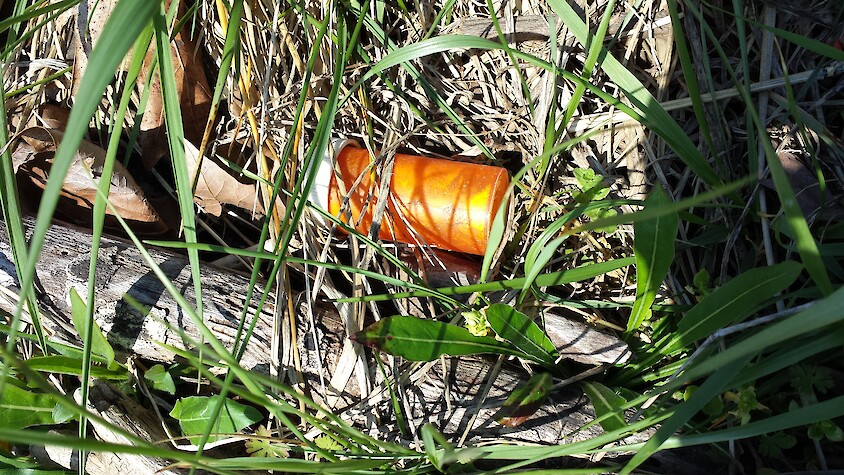We Blacks Don't Trust Us Scientists: Helping to Bridge a Gap Between Two Communities I am a Part of
Shakira Goffe · 17 commentsOur class listens to speakers and classmates provide their different perspectives on working with environmental justice (EJ) issues. Some are more passionate about certain topics, while others are more knowledgeable on said topics which give these conversations blended and diverse opinions as well as solutions to the problems being assessed. This week in class was no different. The discussion made it easier for me to face a hurdle I never jumped before; in this case, answering the question of how can I do my part? Being a part of this week's Google Jamboard session has allowed me to get a better understanding of what is to be expected and what needs to be implemented to improve the quality of the environment and areas of the environment I call home.

Certain comments stood out in this week’s class discussion. One was how we need to make this assignment stretch out longer than just a semester. The comment stated how these communities of people already have a trust issue with scientists and we want to gain their trust, and I agree. A friend of mine stated, "America hasn't earned the right to expect blind allegiance from Black folk. We don't trust y'all." I and many Blacks can't understand how our bodies are used to advance in science, and we get nothing but a death sentence. Some examples of this exploitation include Henrietta Lacks and the development of HeLa cells, and also James Marion Sims performing gynecological surgeries with no anesthesia on black enslaved women. These experiments caused people of my community to lose trust in the medical field workers, which affects us still to this day.

We need to find a way for marginalized communities to trust people conducting these studies. I find it imperative for these workers to be empathetic to the Black community and other minorities, due to repeated traumas these communities have experienced. These traumas do not make us want to trust people in certain work environments. We scientists should find ways for me and people in my community to be comfortable in communicating and taking surveys that give collectors the information they want on our community. It was also said in class to make sure collaborators are mentioned in the projects. People coming and going, or starting a project and finishing it, or not incorporating people from their community will not build this trust.
Translating for communities with a language barrier was also mentioned by a student in class. That student was talking about foreign languages and I instantly thought of my family. I come from a blended family and I have taught students who did not learn English as their first language, so I understand wanting to bridge that gap, but I thought of a different language barrier situation. I've been told by friends and family that they hate talking to doctors because they use these "fancy terms." When I speak, I always make sure to “read the room” and to change the vernacular used with certain audiences if needed. Although it's English, you need to break it down. Translate what's being said in a way people in these areas understand how their community is being affected.
While it's nice hearing these conversations, I'd be more impressed seeing them acted out. The Jamboard conversation in class seemed genuine, and I want to be optimistic in thinking that things will go as planned, but I worry it won't. Society has been aware of these problems for years and yet no one cared enough to fix the issues; society would either turn a blind eye, or believe the issues don't exist. I would like to think things would be different now, and people would care enough to fix these injustices, but in 2021 we still have issues we are facing that are similar to those from years ago. My concern is that certain people with the authority, power, ability, and funds to do something to solve these problems won't partake in these projects because they don't affect the right/white communities. I don't feel it would halt the process, but it may prolong it. I can't speak for other communities, but Black people always make a way, and this would be no different.
However, I do feel there are people in high positions that are doing little things that could do more to help Black and brown communities. For example, in class I spoke on medical waste disposal for prescription drugs, and I realized that because this opioid epidemic is so severe in white communities they're trying to get the drugs off the streets and provide help to substance abusers. When the crack/cocaine epidemic hit the Black community, instead of eradicating the drug from the streets, they eradicated the people and didn't care to help the victims. They placed Black victims in jails and in my opinion they used, and continue to use, these bodies for modern-day slavery. That's a discussion for another time, but I do feel if we could reach the right people who are willing to put in the work, the EJ issues mentioned in class could be solved.
I have lived through some of the injustices previously mentioned. Even though the management of EJ isn't my field of expertise, I tried applying the topics of in-class conversations to my field of study. I mentioned the work I did with prescription drugs and stated how it could affect these urbanized areas; if these drugs aren't disposed of correctly, the environment surrounding these areas will also be impacted, such as the soil and local waterways that lead to the ocean. I'm sure there are other ways I could find to bring the two fields together and I plan to do my part to work on solving the problems in both fields of study.

This is one of the few classes that I feel directly affects neighborhoods, such as my own. If I can be more knowledgeable on these topics then I can spread the word to my community by not being so technical and speak "their language" as mentioned before. I can be a voice for my community and get them more involved with programs and projects that will better their environment; that is how I plan to do my part.
About the author
Shakira Goffe

Shakira Goffe is a second-year master’s student attending the University of Maryland Eastern Shore. She is in the Marine, Estuarine and Environmental Sciences program with a concentration in ecological foundations. She is advised by Dr. Paulinus Chigbu, while focusing her thesis on Factors Influencing the Population Dynamics of Pinfish in Maryland Coastal Bays.
Next Post > Facilitating a Great Barrier Reef partnership workshop in Brisbane
Comments
-
Isabel 5 years ago
I appreciate this post for how you integrated so many aspects of Ej and other injustices that black and brown communities have endured throughout history and on into the present. Not only do these communities face injustices, but the translational issue that you mention is an aggravating factor. By not being able to speak with others about injustices, particularly those not in your community that have the power to elicit change, injustices are allowed to continue. As your last paragraph says, if we can spread knowledge within our own communities, we can be hopeful about making an impact on the environment; whether it be on an individual or community level.
-
Peter 5 years ago
A good reminder for the danger of medical waste. When I was little, there was a river where medical waste was handled secretly. Fortunately, this was found out by parents and banned after I went there again to play. This also made me realize that if the parents have not received relevant education and the children are not reminded, these wastes will be extremely harmful to children. Education is necessary. It can remind people that you are 'in danger', and it can also tell them 'why you are in danger' and provide them with 'how to improve their anti-risk ability'.
-
Katrina Kelly 5 years ago
Beautifully stated, Shakira. Your blog speaks poignantly to my own familial and personal challenges with our scientific, but particularly, medical community. And, to your point, the "language barrier" is often as real when we refer to American Black communities as racial/ethnic groups who speak English as a second language (or not at all). I have personally experienced the impact of my complaints of pain requiring my insistence to be heard and responded to, a possible residual effect of historical medical training that teaches that Black people have a higher threshold for pain. The work that we are doing in this course (and hopefully beyond it) offers a path to getting at the heart of justice through purposeful communication and intentional restoration.
-
Taylor Gedeon 5 years ago
This was a powerful and well-done blog. I admire and appreciate the personal examples and tie-ins that you openly provided. Acting as the bridge between research and a community you are part of is a difficult line to walk, but an incredibly important one.
-
Chelsea Richardson 5 years ago
Great blog! I recently read an article "Stop Saying Black People 'Distrust' Scientist. You're Blaming the Victim," by Michael Crawford in Newsweek and in it he states that there is an overwhelming amount of African Americans that do want the COVID vaccine, and it isn't their unwillingness to get the vaccine from historic devaluing of black lives in the medical field, but it's the lack of resources (lack of internet, inflexible work hours, white people who have resources coming into black neighborhoods and taking available appointments) the black community has is the problem we are not seeing the community getting vaccinated. It is similar to what disadvantaged communities face in environmental justice. Disadvantaged communities often lack the resources to recover from environmental impacts or hazards compared to white and wealthy people.
-
Ashley Silver 5 years ago
I love it!!! Your blog address environmental injustice issue people of color face daily. Especially the unfair treatment of substance abusers. When you said some people hate talking to the doctor. I've seen some who hate going to the doctor, as well, due to the language barrier. It's a must for people to educated themselves on human health. Your blog title tells it all.
-
Faith Taylor 5 years ago
I LOVEEEEEE the quote. You also address the challenges that our class is facing. I also love that you connected this post to the Black community and your own experiences as a Black person. Very well done
-
Megan 5 years ago
A very powerful blog. I hope our final product can start to push power to provide more equitable resources. I also hope these conversations from class and your reflection guide academia and white researchers to be more accountable to Black communities and better question askers.
-
Amber 5 years ago
Thank you for sharing your perspective and thoughts on this, Shakira. This issue of trust is both a historic and prescient issue that must be addressed. What will be important in the years to come is whether we can truly listen to and earn the trust of these communities, capture their concerns, and inspire change that will make a difference for them.
-
Sarah 5 years ago
"Society would turn a blind eye or believe the issues don't exist." A very power quote, Shakira!
-
Andrea M Miralles-Barboza 5 years ago
Powerful. I think you make a great point (as does Chealsea) that there is a misunderstanding of Black communities as weary of science as if they didn't believe science itself-but the issue is so much deeper than that as you explained. When science is done in an exclusionary way, or in many cases at the expense of some of course there is weariness. This is something we as scientists, in all fields, should all take deeper looks at.
-
Olivia Wolford 5 years ago
Thank you for sharing this important and essential perspective- it's so necessary for more scientists to understand why they haven't earned the trust of so many marginalized communities. I appreciate that you also connected it to ongoing conversations within our own class. Great job!
-
Jehnae Linkins 5 years ago
This was a great read. This addressed environmental injustice issues that people of color face on a daily basis. As a black women, I can relate to this whole heartedly. As a scientist myself I can see how and why this is an issue. I hate to say it but in my classes this is how we are taught to do things and how its always been. Hopefully, this generation can be the change.
-
Imani Black 5 years ago
I love the moments where you when you get to dive into another person experiences and completely feel seen. I will echo the words of our black peers, I felt so seen and understand by your words. Being a woman but especially a woman of color in science can be tiresome and frustrating. Thank you for being open and transparent about your experiences.
-
Imani Wilburn 5 years ago
I love the examples of why black people do not have faith in science. This connects to me currently because with Covid-19 while my father takes it extremely seriously, he refuses to get the vaccine because of this mistrust. This along with what you mentioned creates such a barrier and really makes it hard to tackle environmental justice when the communities being harmed or denied are so mistrustful of the people coming to assist. Your highlight of these issues along with the great detail you go into is so important because not only do we have this issue being highlighted, but it is being highlighted by a black woman, which makes it even more powerful within our communities to learn about these issues from one of their own.
-
Nylah McClain 5 years ago
I see this same fear of science in regards to the covid vaccine as well. However, the fear within those I’ve spoken with go beyond various conspiracy theories. The fear is so deep that the most explanation I can get for not getting the vaccine is “I just want to wait and be sure.” I myself reflected this fear during tests of the covid vaccine and considering the history of Black people and medical development I can’t exactly fault these people for their fears.
-
Nylah McClain 5 years ago
I see this same fear of science in regards to the covid vaccine as well. However, the fear within those I’ve spoken with go beyond various conspiracy theories. The fear is so deep that the most explanation I can get for not getting the vaccine is “I just want to wait and be sure.” I myself reflected this fear during tests of the covid vaccine and considering the history of Black people and medical development I can’t exactly fault these people for their fears.